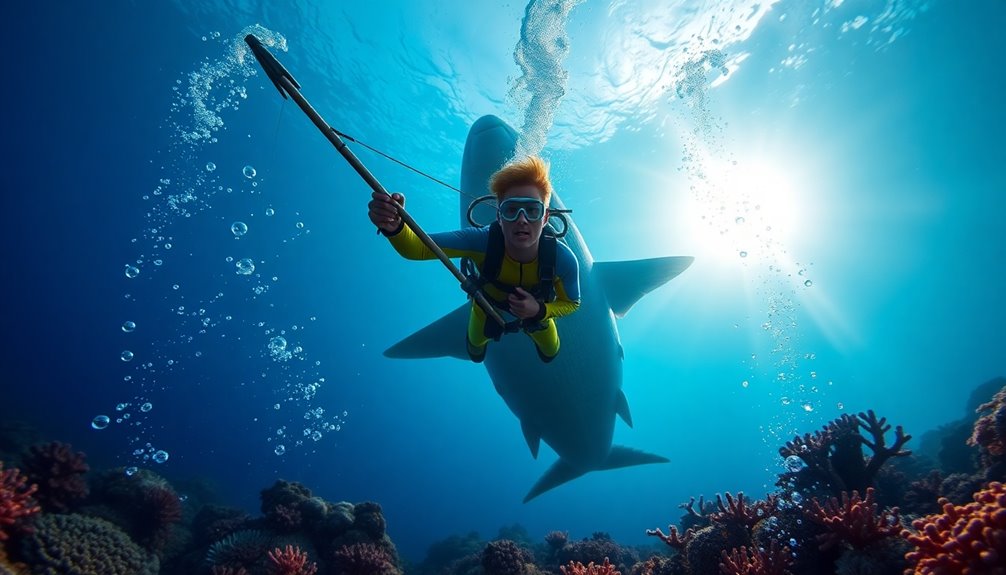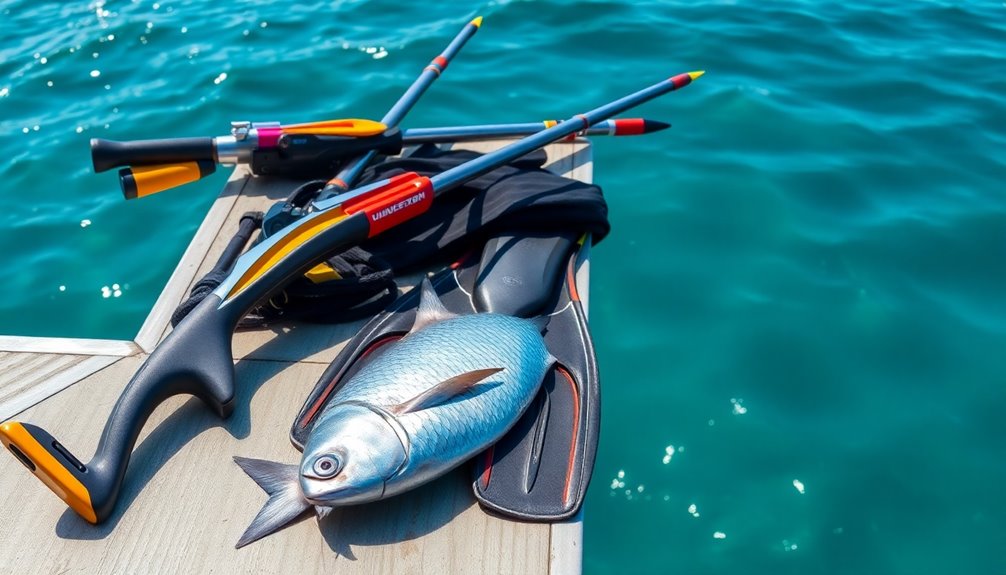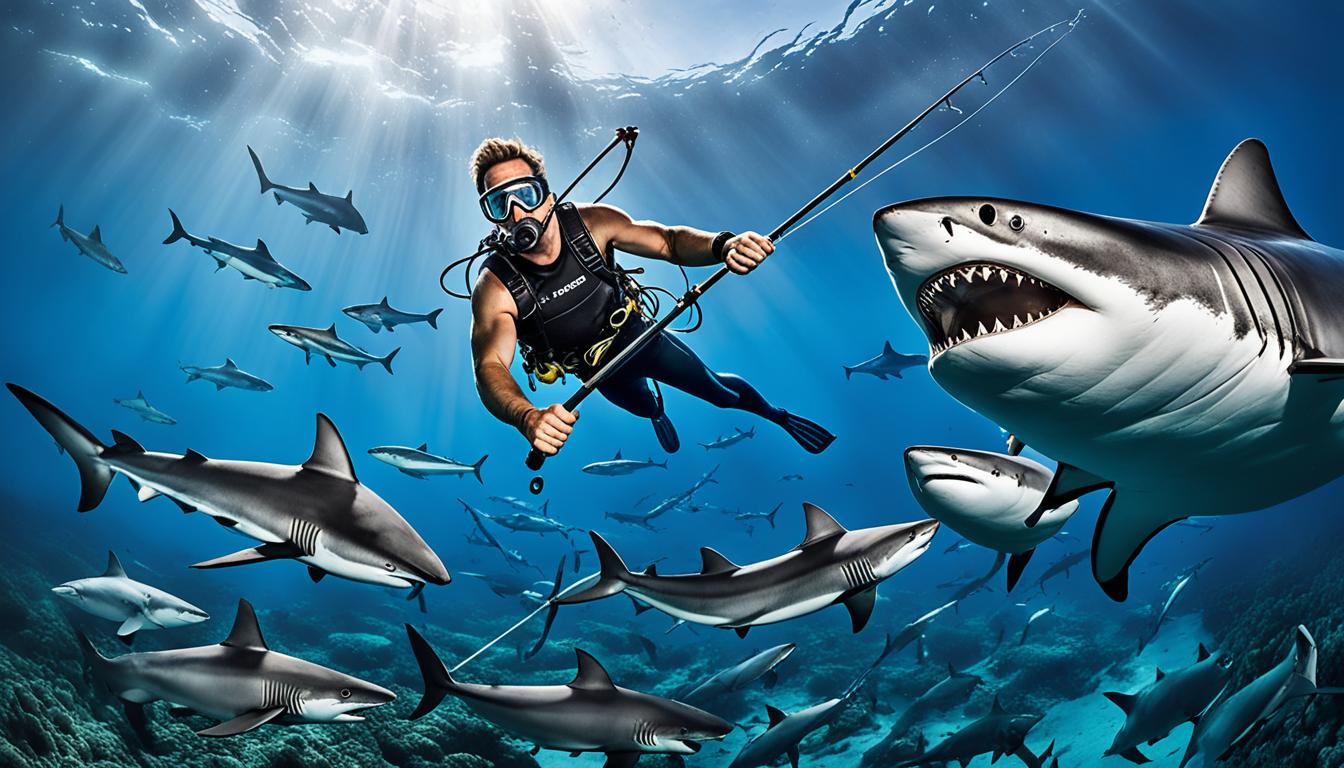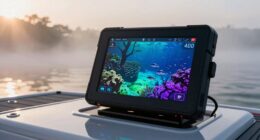Spearfishing is thrilling, but it comes with risks you need to know! Always handle your speargun carefully and check it before each dive to avoid accidents. Keep an eye on your buddy and watch for signs of trouble, like confusion. Knowing your limits in strong currents is smart, and practicing good breathing techniques helps too. Remember to stay alert about marine life and plan your dives well. Having the right gear, like a sharp diving knife and a quality mask, is vital. If you're curious about more safety tips and tricks, there's plenty more to explore!
Key Takeaways
- Always treat spearguns as if they are loaded, maintaining proper handling to prevent accidental discharges and injuries.
- Conduct regular maintenance checks on all equipment, ensuring spearguns, masks, and snorkels are functioning properly before each dive.
- Use proper breathing techniques to avoid hypoxia and shallow water blackout; recognize distress signs in yourself and your buddy.
- Dive with a partner and maintain the buddy system; stay within sight and establish clear communication for safety.
- Be aware of environmental conditions and hazards like strong currents and marine life; always unload spearguns before exiting the water.
Understanding Equipment-Related Risks
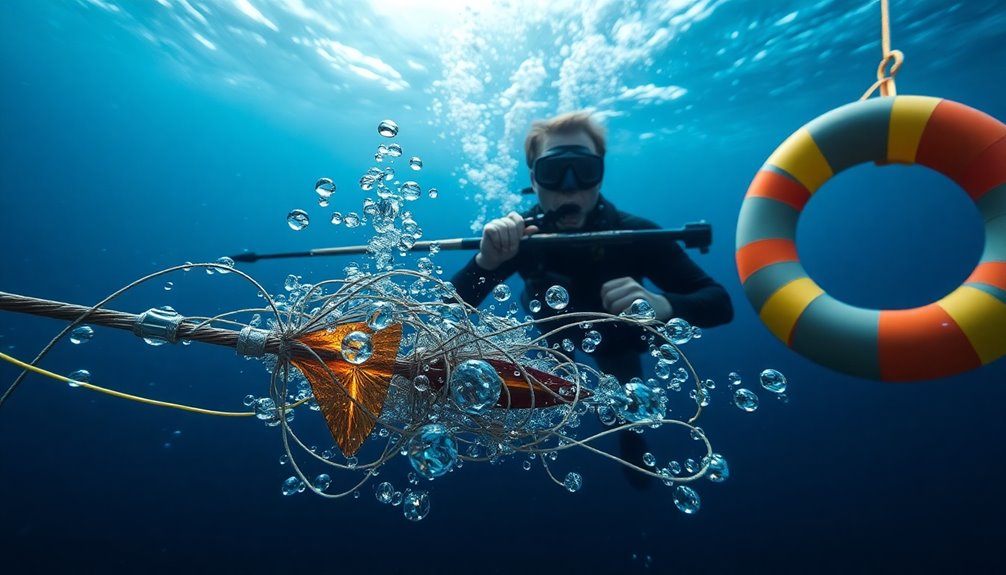
When you're out spearfishing, understanding equipment-related risks is crucial for your safety.
First, let's talk about spearguns. If you don't handle them properly, they can cause injuries. Even if you think everything's safe, remember that safety switches can sometimes fail, leading to accidental discharges. That's why it's super important to check your gear regularly. Regular maintenance checks are essential to ensure your equipment reliability.
Also, be cautious about how much tension you put on those bands. Overloading them can increase the chances of misfires. Imagine the power behind those bands! If they accidentally fire, you could get seriously hurt.
Now, let's not forget about entanglements. Discarded fishing lines and nets can be tricky. If you're using Hawaiian slings or pole spears with reels, make sure your lines are clear. Getting tangled could lead to drowning, which is scary!
To stay safe, never aim a loaded speargun at anyone. Always load it off to the side, and keep it away from others. Trusting your equipment is good, but always stay aware of your surroundings.
Enjoy your spearfishing adventure, but remember to prioritize safety!
Identifying Physical and Health Hazards
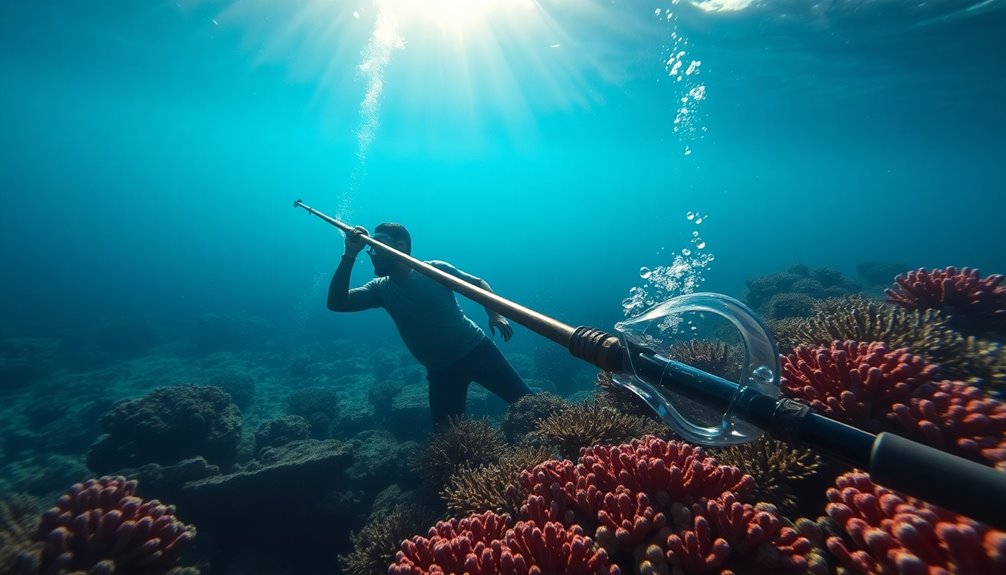
Identifying physical and health hazards is essential for ensuring your safety while spearfishing. When you hold your breath for too long, you risk hypoxia, which can lead to something called shallow water blackout (SWB). This happens when your brain doesn't get enough oxygen, and it can be very dangerous. Always remember to breathe properly and avoid hyperventilating before diving!
Swimming against strong currents can tire you out fast. You might feel exhausted and even disoriented. Make sure you know your limits and take breaks when you need them. Diving in unpredictable water can increase stress on your body, too. Ocean conditions can change rapidly, so always monitor the weather before heading out.
Watch out for marine life, like sharks or barracudas, and steer clear of structures like oil rigs or shipwrecks, where you could get tangled up. Poor visibility can make everything tricky. Always know where you're going!
Lastly, don't forget about health risks like dehydration or ear injuries from pressure changes. If you dive too much without resting, your body can struggle.
Stay aware, stay safe, and enjoy the amazing underwater world!
The Importance of Training
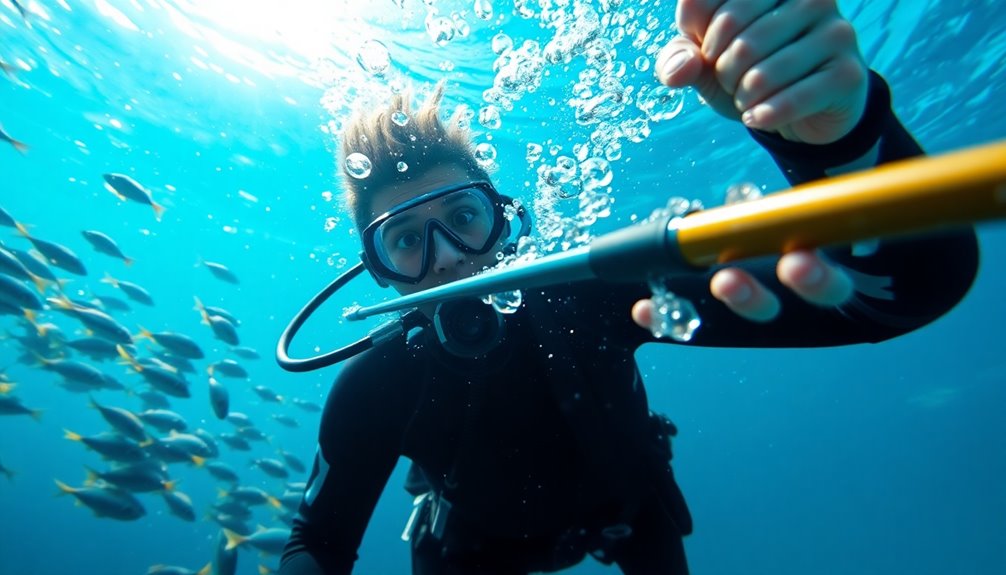
To ensure your safety and enhance your spearfishing experience, proper training can't be overlooked. It's not just about diving in; it's about being prepared. Comprehensive training courses cover essential skills like using your equipment safely and navigating underwater. They help you identify fish and reduce the risk of accidents, so you can dive with confidence.
Freediving training is super important, too! It gives you the fundamental skills you need. You'll learn how to breathe properly, which helps you stay calm and focused in the water. Knowing how to control your body and fins means you can conserve energy for longer dives. Additionally, regular freediving pool training helps you build CO2 tolerance and improve your overall performance.
Structured training in pools is a fantastic way to build endurance and mental strength. You can practice your diving techniques and even simulate real-life challenges. Plus, training with a buddy helps you both stay safe and informed about your dive plans.
Lastly, mastering your equipment is crucial. Regular checks and maintenance keep everything in top shape. When you know your gear well, you're less likely to face surprises underwater.
Essential Speargun Safety Rules
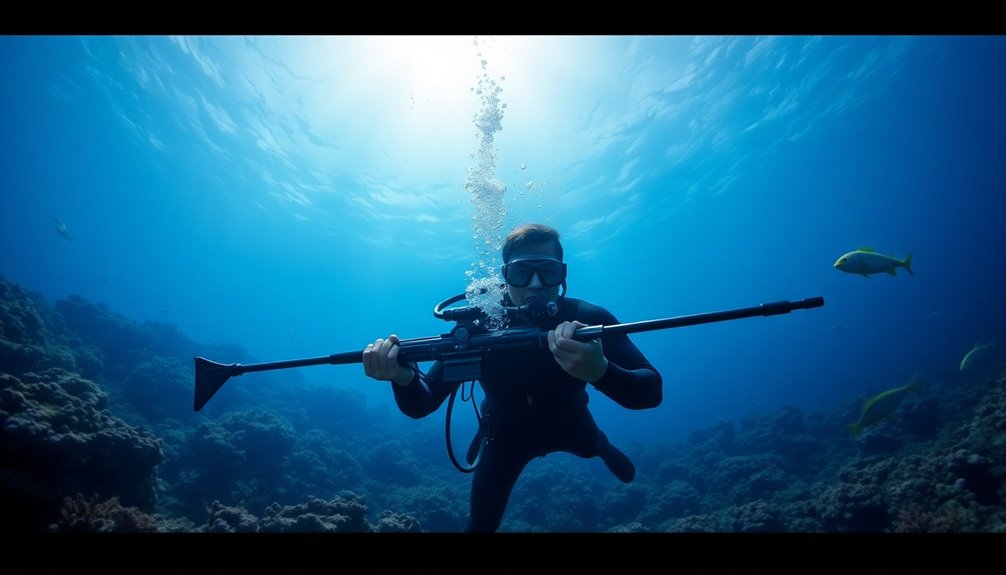
How can you ensure a safe and enjoyable spearfishing experience?
First, always handle your speargun with care. Never load it out of the water, and always keep your finger away from the trigger until you're ready to shoot. Remember, a loaded speargun is like a loaded gun—treat it as if it's always ready to fire!
When aiming, it's essential to know what's behind your target. Avoid pointing your speargun at dive buddies or anyone else. Keeping the tip pointed away from body parts is also crucial. Additionally, be mindful of the potential for blackouts and loaded spearguns, which can lead to dangerous situations if not properly managed.
After your dive, always unload your speargun before leaving the water.
And don't forget to maintain it! Check for tangles and undo the rubbers when you're not using it.
Safety is key, so lock up your speargun when it's not in use, especially if kids are around.
Be aware of the ocean and its possible dangers. Avoid going out alone or in bad conditions.
Key Environmental and Safety Gear
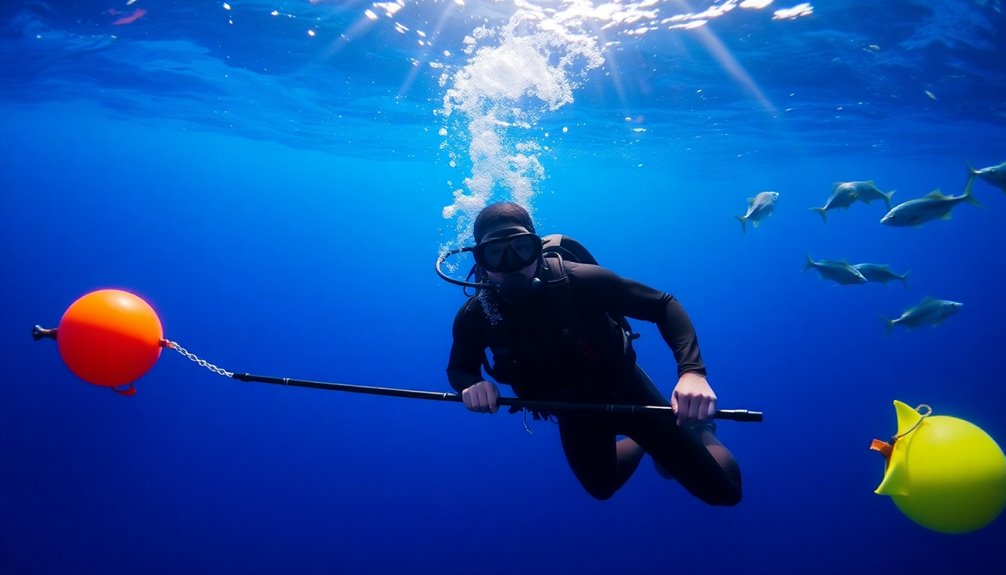
Five essential pieces of environmental and safety gear can significantly enhance your spearfishing experience.
First, invest in a good-quality mask. A low-volume mask not only provides an excellent field of view but also makes deep diving easier, allowing for better equalization during your dives.
Next, consider sturdy fins. Large fins give you the power you need while helping you maneuver smoothly through the water.
You'll also want a specially designed wetsuit. Look for one with camouflage patterns, as this helps you blend in with the ocean environment, making your hunt more successful.
Don't forget a diving knife! It's handy for emergencies and for processing your catch.
Lastly, check your speargun. Make sure it has safety catches and line releases to prevent accidents.
Remember, strong currents and marine predators can be unpredictable, so having the right gear is crucial for your safety.
Always maintain your equipment. Regular checks for wear and tear can help prevent malfunctions.
With these five essential pieces of gear, you can enjoy your spearfishing adventure while staying safe and responsible in the beautiful underwater world! Whether you’re a seasoned diver or a beginner, having the right equipment will enhance your experience and help ensure your safety. Don’t forget to familiarize yourself with local regulations and conservation practices, which are crucial in preserving these vibrant ecosystems. Additionally, there are numerous Florida spearfishing destinations to explore, each offering unique underwater landscapes and diverse marine life that will make your adventure unforgettable.
Strategies for Avoiding Common Accidents
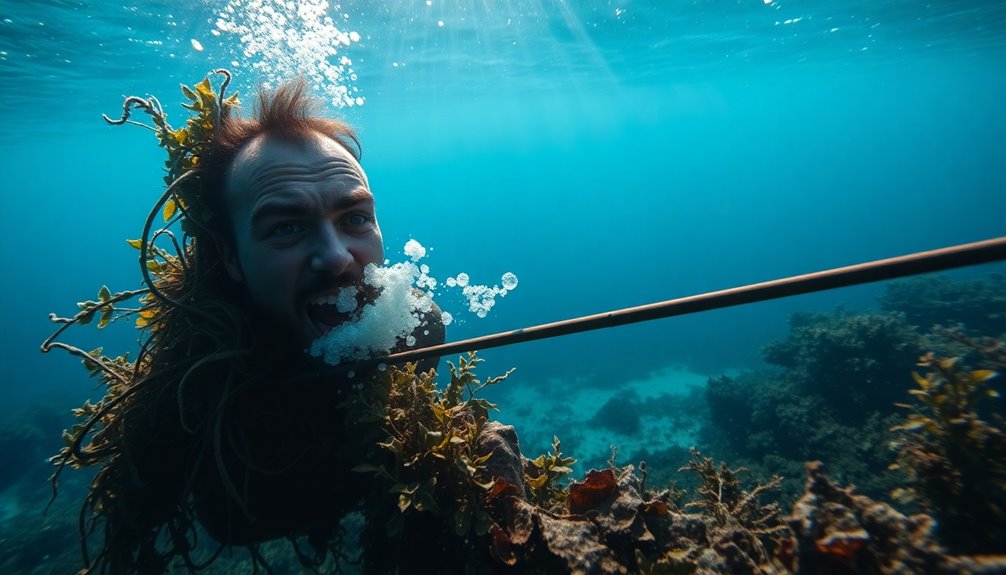
When out on the water, prioritizing safety can make all the difference in preventing accidents while spearfishing.
First, always handle your speargun with care. Never point it at anyone or anything that's not your target. Keep it unloaded until you're ready to dive, and remember to unload it before handing it back to your crew. When loading, make sure it's pointed safely away from people.
Next, stay aware of your surroundings. Watch for other divers, boats, and marine life. Use a dive float and a diver below flag to let boats know where you are. It's crucial to communicate with your diving partners, so everyone knows each other's positions. Additionally, understanding strong currents can help you anticipate fish behavior and improve your chances of success.
Pay attention to diving conditions, too. Avoid diving in bad weather or strong currents. Don't push your limits—dive within your skill level and always go with a buddy, especially below 6 meters.
Lastly, ensure your equipment is in great shape. Check that your speargun works properly and use the safety catch until you're ready to shoot.
Preparing for Emergency Situations

Even with the best safety strategies in place, it's vital to be prepared for emergency situations while spearfishing. You might encounter problems like a buddy blacking out or getting tangled. Recognizing distress signs, like confusion or a glazed look, is crucial. If you notice these, support your buddy's head, keep their airway clear, and signal for help. A gentle tap or calling their name can help them recover.
It's also important to check your gear regularly. Make sure your masks, snorkels, and spearguns work properly. Keep emergency equipment, like signaling devices and first aid kits, close by. Don't forget a cutting tool for entanglements!
Always dive with a buddy. Stay aware of each other's condition and communicate clearly. Discuss who handles the speargun beforehand and stay within sight of each other. Remember that timely recognition of early indicators of distress can significantly reduce the risk of a blackout.
After an incident, keep your buddy calm and horizontal in the water. Watch for any signs of secondary drowning, like trouble breathing. If symptoms persist, seek medical help.
Remember to document what happened to improve your safety for next time. Being prepared can turn a scary situation into a safe, manageable one!
Frequently Asked Questions
What Are the Legal Requirements for Spearfishing in My Area?
To find the legal requirements for spearfishing in your area, start by checking if you need a valid fishing license. You might also need a free underwater spearfishing permit. Make sure these licenses are up-to-date!
Next, learn about any restricted areas where spearfishing isn't allowed, like swimming zones or protected marine areas.
Finally, remember to follow rules about gear, catch limits, and any special local regulations.
Happy spearfishing!
How Can I Choose the Right Speargun for My Experience Level?
Choosing the right speargun is super important!
If you're just starting out, go for a short one, around 90 cm. It's easier to handle and helps with aiming.
As you get better, you can try longer spearguns for more power and distance.
Think about where you'll be fishing too; clear water needs longer guns, while murky water is better with shorter ones
What Type of Fish Are Commonly Targeted in Spearfishing?
When you go spearfishing, you'll find many exciting fish to target!
Beginners often start with herbivorous fish like surgeonfish and parrotfish. As you gain experience, you might try catching medium-sized fish like groupers or snappers.
For a challenge, look for larger predators like wahoo or kingfish. Don't forget about tasty crustaceans like lobsters!
Each choice can make your adventure even more thrilling and delicious. Enjoy your time underwater!
How Do Weather Conditions Affect Spearfishing Safety?
Weather conditions play a big role in how safe your spearfishing adventure is!
When there are high-pressure systems, you'll enjoy clear skies and calm waters, making it easier to dive.
But if a low-pressure system rolls in, expect rough waves and strong winds. This can stir up sediment, reducing visibility.
Always check the weather before heading out, and remember that sunny days with gentle winds are the best for a safe and fun experience!
What Should I Do if I Encounter Marine Life While Spearfishing?
If you encounter marine life while spearfishing, stay calm and keep a safe distance.
Observe their behavior; if they seem curious or aggressive, it's best to move away slowly.
Avoid areas where large animals are feeding or breeding, as this can lead to dangerous situations.
Remember, knowing the local marine life helps you anticipate what might happen.
Always dive with a buddy, so you can support each other if needed!
Conclusion
Now that you know the dangers of spearfishing and how to stay safe, you're ready for an exciting adventure! Remember, it's all about having fun while being smart. Always check your gear, watch out for your surroundings, and never dive alone. With the right training and precautions, you can enjoy the underwater world safely. So grab your speargun, dive in, and make unforgettable memories! Happy spearfishing, and stay safe out there!

